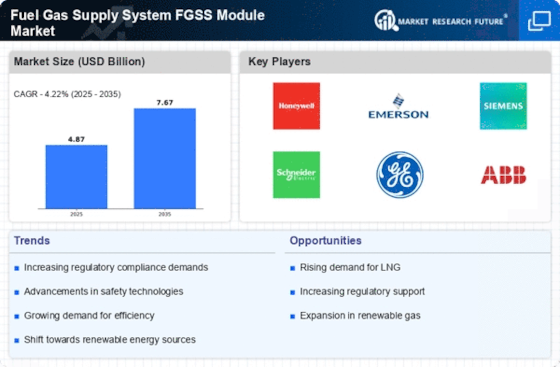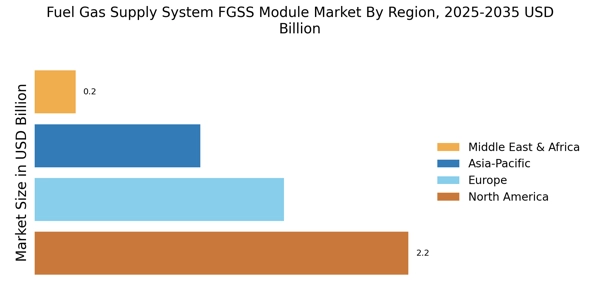Rising Energy Security Concerns
Rising energy security concerns are influencing the Fuel Gas Supply System FGSS Module Market. As geopolitical tensions and supply chain vulnerabilities become more pronounced, nations are increasingly focused on securing their energy supplies. This has led to a heightened interest in diversifying energy sources, with natural gas emerging as a key component of energy security strategies. The need for robust fuel gas supply systems to ensure reliable access to natural gas is likely to drive the demand for FGSS modules. Furthermore, investments in domestic gas production and infrastructure are expected to bolster the market, as countries seek to reduce dependence on foreign energy sources.
Increasing Demand for Natural Gas
The rising demand for natural gas as a cleaner alternative to coal and oil is a primary driver for the Fuel Gas Supply System FGSS Module Market. As countries strive to reduce carbon emissions, natural gas is increasingly viewed as a transitional fuel. According to recent data, natural gas consumption is projected to grow by approximately 1.5% annually over the next decade. This shift is likely to necessitate the expansion of fuel gas supply systems, thereby enhancing the market for FGSS modules. Furthermore, the integration of these systems into existing infrastructure is expected to facilitate a smoother transition to cleaner energy sources, making them indispensable in the evolving energy landscape.
Infrastructure Development Projects
Infrastructure development projects, particularly in emerging economies, are propelling the Fuel Gas Supply System FGSS Module Market. Governments are investing heavily in energy infrastructure to support economic growth and energy security. For instance, the International Energy Agency has indicated that investments in gas infrastructure could reach trillions of dollars over the next decade. This influx of capital is likely to drive the demand for FGSS modules, as they are essential for the efficient distribution and management of natural gas. Additionally, the modernization of existing infrastructure to accommodate new technologies further underscores the importance of FGSS modules in meeting future energy demands.
Regulatory Support for Cleaner Energy Solutions
Regulatory support for cleaner energy solutions is a crucial driver for the Fuel Gas Supply System FGSS Module Market. Governments worldwide are implementing policies and regulations aimed at promoting the use of natural gas as a cleaner energy source. For instance, various countries have established incentives for the adoption of natural gas technologies, which can enhance the appeal of FGSS modules. Additionally, stricter emissions regulations are compelling industries to transition to cleaner fuels, further boosting the demand for efficient gas supply systems. This regulatory landscape is expected to create a favorable environment for the growth of the FGSS module market.
Technological Innovations in Gas Supply Systems
Technological innovations are reshaping the Fuel Gas Supply System FGSS Module Market. Advancements in automation, monitoring, and control technologies are enhancing the efficiency and reliability of gas supply systems. For example, the implementation of smart grid technologies allows for real-time monitoring and management of gas flows, which can significantly reduce operational costs. Moreover, the integration of artificial intelligence and machine learning in gas supply systems is expected to optimize performance and predict maintenance needs. As these technologies become more prevalent, the demand for advanced FGSS modules that can support such innovations is likely to increase, driving market growth.

















